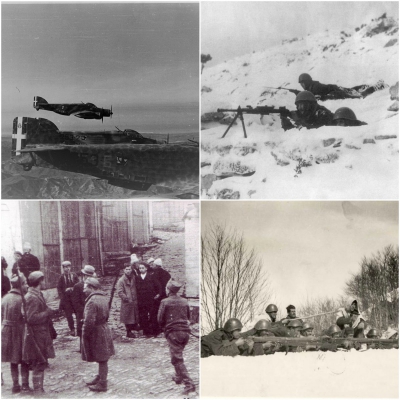The Battle of ElaiaKalamas (Greek: -, romanized: Machi Elaias-Kalama) took place in Epirus on 28 November 1940. The battle was fought between the Greeks and the Italians during the initial stage of the Greco-Italian War in World War II. The Italian Army, deployed on the Greek-Albanian border, launched an offensive against Greece on 28 October 1940. The main thrust of the Italian invasion occurred in the Epirus sector, with a further flanking move through the Pindus mountains. In Epirus, the Greeks held the ElaiaKalamas river line, and, even though the Greek army was outnumbered, the local Greek forces under Major General Charalambos Katsimitros stopped the Italian advance. Along with the Italian failure in the Battle of Pindus, these Greek successes signified the complete failure of the Italian invasion, leading to the dismissal of the Italian commander in Albania, Sebastiano Visconti Prasca, on 9 November. In the next few weeks the Greek forces initiated a counteroffensive that forced the Italians to retreat deep into Albania.
The Greco-Italian War (Italo-Greek War, Italian Campaign in Greece; in Greece: War of '40) took place between the kingdoms of Italy and Greece from 28 October 1940 to 23 April 1941. This local war began the Balkans Campaign of World War II between the Axis powers and the Allies and eventually turned into the Battle of Greece with British and German involvement. On 10 June 1940, Italy declared war on France and the United Kingdom. By September 1940, the Italians had invaded France, British Somaliland and Egypt. This was followed by a hostile press campaign in Italy against Greece, accused of being a British ally. A number of provocations culminated in the sinking of the Greek light cruiser Elli by the Italians on 15 August. On 28 October, Mussolini issued an ultimatum to Greece demanding the cession of Greek territory, which the Prime Minister of Greece, Ioannis Metaxas, rejected.
Italy's invasion of Greece, launched with the divisions of the Royal Army based in Italian-controlled Albania, was a fiasco marked by low morale and poor planning: the Italians encountered unexpectedly tenacious resistance by the Hellenic Army and had to contend with the mountainous and muddy terrain on the Albanian–Greek border. By mid-November, the Greeks had stopped the Italian invasion just inside Greek territory. As the British bombers and fighter aircraft struck Italy's forces and bases, the Greeks completed their mobilization and counter-attacked with the bulk of their army to push the Italians back into Albania – an advance which culminated in the Capture of Klisura Pass in January 1941, a few dozen kilometers inside the Albanian border. The defeat of the Italian invasion and the Greek counter-offensive of 1940 have been called the "first Axis setback of the entire war" by Mark Mazower, the Greeks "surprising everyone with the tenacity of their resistance".
The front stabilized in February 1941, by which time the Italians had reinforced the Albanian front to 28 divisions against the Greeks' 14 divisions (though Greek divisions were larger). In March, the Italians conducted the unsuccessful Spring Offensive. At this point, losses were mutually costly, but the Greeks had far less ability than the Italians to replenish their losses in both men and materiel, and they were dangerously low on ammunition and other supplies. They also lacked the ability to rotate out their men and equipment, unlike the Italians. Requests by the Greeks to the British for material aid only partly alleviated the situation, and by April 1941 the Greek Army only possessed one more month's worth of heavy artillery ammunition and was unable to properly equip and mobilize the bulk of its 200,000–300,000 strong reserves.Adolf Hitler decided that the increased British intervention in the conflict represented a threat to Germany's rear, while German build-up in the Balkans accelerated after Bulgaria joined the Axis on 1 March 1941. British ground forces began arriving in Greece the next day. This caused Hitler to come to the aid of his Axis ally. On 6 April, the Germans invaded northern Greece ("Operation Marita"). The Greeks had deployed the vast majority of their men into a mutually costly stalemate with the Italians on the Albanian front, leaving the fortified Metaxas Line with only a third of its authorized strength. Greek and British forces in northern Greece were overwhelmed and the Germans advanced rapidly west and south. In Albania, the Greek army made a belated withdrawal to avoid being cut off by the Germans but was followed up slowly by the Italians. Greece surrendered to German troops on 20 April 1941 and to the Italians on 23 April 1941. Greece was subsequently occupied by Bulgarian, German and Italian troops. The Italian army suffered 102,064 combat casualties (with 13,700 dead and 3,900 missing) and fifty thousand sick; the Greeks suffered over 90,000 combat casualties (including 14,000 killed and 5,000 missing) and an unknown number of sick.

1940Nov, 8
Greco-Italian War: The Italian invasion of Greece fails as outnumbered Greek units repulse the Italians in the Battle of Elaia-Kalamas.
Choose Another Date
Events on 1940
- 17May
Brussels
World War II: Germany occupies Brussels, Belgium. - 12Jun
Erwin Rommel
World War II: Thirteen thousand British and French troops surrender to Major General Erwin Rommel at Saint-Valery-en-Caux. - 5Jul
Vichy France
World War II: The United Kingdom and the Vichy France government break off diplomatic relations. - 10Jul
Vichy France
World War II: The Vichy government is established in France. - 11Jul
Vichy France
World War II: Vichy France regime is formally established. Philippe Pétain becomes Prime Minister of France.

 English
English  español
español  français
français  português
português  русский
русский  العربية
العربية  简体中文
简体中文 